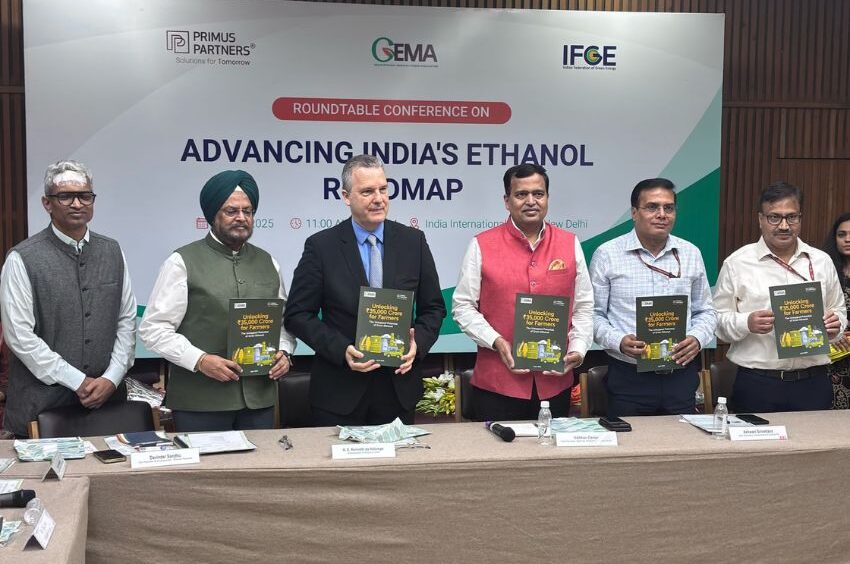Grain Ethanol Can Boost Farmer Incomes by Rs 35,000 Cr, Says New Report

High-level roundtable launches roadmap to scale grain-based ethanol, unlock rural prosperity, and power India’s clean energy transition
India’s grain ethanol industry received a significant push forward today with the introduction of a ‘Thought Leadership Report’ and a high-powered roundtable that brought together senior policymakers, industry leaders, ethanol producers, and experts to shape the sector’s future. The report outlines a strategic roadmap highlighting how the ethanol sector, particularly through grain-based feedstocks like maize and surplus rice, can generate over Rs 35,000 crore annually in direct income for Indian farmers while driving energy security and climate action.
India’s ethanol blending journey has been a global success story, achieving a 19.6 per cent ethanol blend in petrol by January 2025—well ahead of the original 20 per cent target for the end of the year. Since 2022, the Ethanol Blended Petrol (EBP) Programme has helped save Rs 1.08 lakh crore in foreign exchange, replaced nearly 185 lakh metric tonnes of crude oil, and cut down 557 lakh metric tonnes of carbon dioxide emissions. The report makes a strong case that India, being a grain-surplus nation with 165 lakh metric tonnes of surplus foodgrain annually, can meet both food and fuel demands without compromising food security.
The Thought Leadership Report focuses on the potential of grain ethanol—particularly from maize, which is India’s least water-intensive feedstock and highly efficient for ethanol conversion. By utilizing surplus grain, the industry could inject Rs 35,000 crore annually into the hands of farmers, enabling a new wave of rural economic empowerment, boosting incomes, and curbing migration from villages to cities. However, the report also highlights current challenges, including rising maize prices, limited availability of surplus grain, and ethanol procurement rates that have not kept pace with feedstock cost increases. In addition, shrinking margins on by-products such as Distiller’s Dried Grains with Solubles (DDGS) are affecting distillery viability.
The roundtable, organised by Primus Partners in collaboration with the Grain Ethanol Manufacturers Association (GEMA) and the Indian Federation of Green Energy (IFGE), featured key voices from government and industry. Participants included His Excellency Kenneth H. da Nobrega, Brazilian Ambassador to India; Ashwini Srivastava, Joint Secretary, Department of Food and Public Distribution; Vivek Shukla, Deputy Director General at the Commission for Agricultural Costs and Prices (CACP); Vaibhav Dange, Green Fuel Expert; and Abhinav Singhal, Treasurer and Committee Head of GEMA.
Ashwini Srivastava underlined the government’s proactive stance, stating, “We understand the challenges of the grain ethanol story in India. A roadmap is being planned to address feedstock supply, promote blends like E100/E93/E85, and explore sustainable aviation fuel (SAF). We must work together on this.”
Echoing this sentiment, Abhinav Singhal of GEMA emphasized the vital role grain ethanol has played in India’s ethanol success story. “PM Modiji’s Ethanol Blending Programme is a visionary step to ensure energy security, rural development, and income enhancement for farmers. The grain ethanol sector has become a critical contributor to the EBP, but it now requires targeted policy support to continue thriving.”
Sanjay Ganjoo, Director General of IFGE, reinforced the urgency of coordinated policy action. “India’s grain-based ethanol industry holds transformative potential. We need to ensure steady feedstock availability, promote fair procurement pricing, and enable year-round production. This roundtable represents an important step in building consensus and crafting solutions that will sustain the ethanol sector for the long term.”
The report’s key policy recommendations include rapidly scaling maize cultivation, introducing dynamic ethanol pricing tied to feedstock costs, ensuring uninterrupted supply of broken and surplus rice from the Food Corporation of India, and building strong domestic markets for ethanol by-products. As India deepens its commitment to clean energy, the grain ethanol sector is poised to play a pivotal role—not just in decarbonising fuel use, but in fueling rural growth and farmer prosperity.











































































































































































































































































































































































































































































































































































































































































































































































































































































































































































































































































































































































